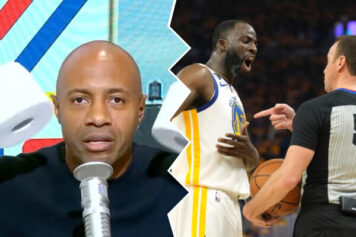This was a new normal: two friends — Raj and Wayne — sitting side by side, taking in a nice evening breeze, listening to a playlist of old-school R&B, while puffing on cigars and taking occasional slow sips of Woodford Reserve double-oaked bourbon.
Despite the absence of a pre-meeting brother-man embrace, and a new strict adherence to social distancing guidelines, the night included the usual banter to which brothers are accustomed — with sports the main topic.
After a deep inhale of his Romeo y Julieta, Raj, a lifelong Knicks fan, sat up in his chair, and bellowed, “I don’t care what Michael Jordan said. There is no question in my mind, after watching The Last Dance, that he was solely responsible for Isiah Thomas not being on ‘The Dream Team.’”
The comment was gasoline for Wayne’s slow-burning fire.
“The Last Dance was good for the NBA, and obviously good for Mike,” the Pistons and ardent Isiah Thomas fan shot back. “But I think the doc also revealed more of his character than even MJ would have liked.”
“It’s Been Enthralling for Me …”
Somewhere in Bristol, CT, the ESPN ratings gods continue to smile. The Last Dance has been the Worldwide Leader’s most-watched documentary ever, and conversation around it continues to sprinkle its networks and social.
Jay Williams is good with the discourse continuing to grow legs — even after all 10 installments averaged 5.6 million same-day viewers.
For the philanthropist, booming businessman and former Duke star, who has been at ESPN since 2003, The Last Dance resonated on a very personal level.
“I’ve seen a lot of sports documentaries [and] I’m not going to be remiss that this is during a pandemic — that viewership is the highest it’s probably ever been to be watching docuseries of this sort. But we also are talking about a person that the majority of the world considers to be the greatest athlete of all time; it’s been enthralling for me,” explained Williams, the second overall pick in the 2002 NBA Draft with the Chicago Bulls, and viewed as the team’s future star post-Jordan.
(That coveted seat would be occupied six years later in 2008 by Derrick Rose.)
The Plainfield, N.J. native’s once-promising NBA career was cut short after a June 19, 2003 motorcycle accident.
“I was drafted second by the Bulls,” explained Williams, who played a single NBA season (2002-’03), with moderate averages of 9.5 points and 4.7 assists per game.
“I spent time with [Bulls owner] Jerry Reinsdorf and [former GM] Jerry Krause. I spent time with the trainers that worked with MJ. In college, I remember going out to California and working his [Flight Camp] two and a half years in a row — spending time with him and watching him.”
Williams also recalls Jordan coming to his defense after his own frustrations boiled over during his lone season in Chicago — a putrid 30-52 season in which he lost more games in the first month of his NBA career than he did in three seasons at Duke.
“I was so frustrated because it seemed like guys didn’t care,” Williams said in a 2010 ESPNChicago.com article. “I remember I got killed in the papers, and I got a call from Michael Jordan, and Michael’s like, ‘Hey, listen, keep speaking out because eventually, people are going to listen. You need somebody to really demand the best out of their team.'”
It’s understandable, then, that The Last Dance carried a bit more weight for him.
“I wanted to see who Michael Jordan the man was and how he’s dealt with everything,” said Williams, who left millions of dollars on the table with his career’s abrupt ending. “You saw how challenging it is to navigate this world.”
“If I had somebody breaking down every aspect of my life, that’s incredibly arduous to live with. For me, it unveiled who he was as a person, and how he dealt with his father, how he dealt with a guy like Gus [Lett] who was his security guy, how he dealt with his mother, his kids, and how he channeled himself. That was unique, that was different. That’s why I said I thought [the series] was the gold standard.”
During The Last Dance’s five-week run, Williams had been one of the network’s more vocal voices — finding his place among the likes of Stephen A. Smith, Jalen Rose, Max Kellerman, and others.

Jay Williams’ Last Dance analysis has elevated his ESPN career
For many retired professional athletes, a second career in TV is often viewed as an obvious next career. Williams took this path begrudgingly and gave little effort — at least initially when he joined ESPNU, the network’s fledgling college sports network that launched in 2005.
”It’s not like I was calling the biggest games — I wasn’t calling Duke-Kentucky,” he said. “I mean … I was in Oxford, Mississippi. I had never been to Oxford, Mississippi in my life. I would take a plane and I would sit in the back [and] I would sometimes be on crutches because I was doing a lot of walking and my knee would hurt.”
Williams’ former teammate at Duke watched him grind from afar.
“I would flip on the channel every now and then and catch him calling a Monmouth game in his first year,” said Shane Battier, who teamed with Williams on Duke’s 2001 national championship team. “He was pretty obscure in his first couple years. He learned that progression is linear, and it takes serious work to appreciate it,” continued Battier, a two-time NBA champion with the Miami Heat, where he is Vice President, Basketball Development & Analytics.
“For J-Will, it clicked after a year … He realized, ‘I could do this’ and, like in basketball, it’s worth it. And you see the dividends today; he’s one of the most talented guys on the network.”
Williams, 38, has found his footing. The network inked him to a multiyear extension with ESPN/ABC last October, and he still serves as a contributing analyst on NBA Countdown, The Jump, the morning show Get Up — while continuing to host the Kevin Durant-produced series The Boardroom.
Williams learned that TV work is far from an uncontested layup. He’s hardly the first athlete to realize that it’s more than sport speak, plus hair and makeup between breaks.
“I think once they make a commitment to express themselves honestly — that is, say what they really think and feel in clean language — those are the ones who are able to achieve,” explained Williams’ former boss, Dan Steir, who left ESPN in 2012 and is now Senior Vice President, Production & Senior Coordinating Producer for NBC Sports Group.
“At the same time, the ones who are able to combine stories, their own experiences [coupled with] facts, analysis and foresight — and add a mixture [and] a recipe of all of those things — end up being the ones who are successful.”
Charita Johnson, a former longtime ESPN executive turned media agent and talent development coach, takes it a step further — adding that the onus is on media executives to teach and provide the resource to transition athletes and help them develop new skills.

Jay Williams hosts “The Boardroom,” produced by Kevin Durant’s Thirty Five Ventures
“You have to understand that athletes never worked without a playbook, so it’s easy to see why they’d get disenchanted because they have no measurement for success,” explained Johnson, whose Johnson Bridge Media roster includes Tony Pike, who was drafted by the Carolina Panthers in the sixth round of the 2010 NFL Draft and cornerback Stanford Routt, who spent the lion’s share of his eight-year NFL career with Oakland.
“Of course, they need discipline to put in the work — as if they were playing games — but they need structure to operate within this new dynamic.”
Basketball’s Continuing Bloodline …
Nightfall had finally come, and Raj and Wayne’s cigars had shrunken down to just a few more puffs. The bourbon had set in, bringing the banter to a measured crawl.
”None of this matters,” Raj said, his voice lowered. “Magic Johnson is still the greatest basketball player of all time. It took Mike six years to get a ring, and Magic brought one to LA his rookie season.”
”As much as I’m not an MJ guy, I can’t put Magic or anybody over him,” Wayne countered. “All I know is, Isiah Thomas and the Bad Boys made him elevate his game.”
For Williams, The Last Dance is even bigger than Jordan — it’s an acknowledgment and recognition of basketball’s continuing bloodline.
“LeBron James never becomes LeBron James without Michael Jordan,” explained Williams. “Michael Jordan never becomes Michael Jordan without Magic Johnson. You can keep going through the lineage — going all the way back to Jackie Robinson in baseball. It’s our fiduciary responsibility to pass this on.”
And to keep the conversation going.



